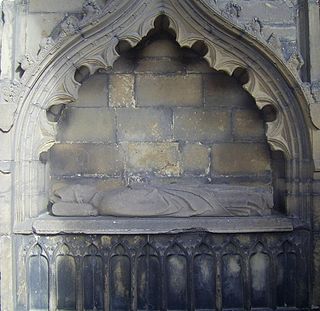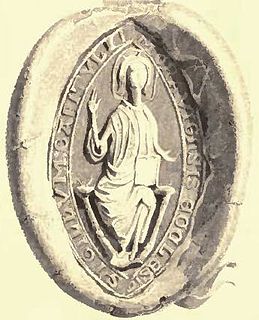Related Research Articles
Robert Crichton was a 16th-century Scottish Catholic cleric.
Ingram Lindsay [Ingeram de Lindesay], Doctor in Canon Law, was a 15th-century Scottish cleric. Despite being of illegitimate birth - one of several sons of an unmarried nobleman and an unmarried woman - he nevertheless managed in the end to pursue a successful ecclesiastical career.

Henry de Lichton [de Lychtone, Leighton] was a medieval Scottish prelate and diplomat, who, serving as Bishop of Moray (1414–1422) and Bishop of Aberdeen (1422–1440), became a significant patron of the church, a cathedral builder, and a writer. He also served King James I of Scotland as a diplomat in England, France, and Italy.
Alexander de Kininmund was a 14th-century Scottish churchman. The first mention of Alexander occurs when, as a canon of Dunkeld he is one of three ambassadors sent by King Robert I of Scotland to Avignon in 1320. The purpose of this embassy was to present a letter to Pope John XXII known as the Declaration of Arbroath. As a papal chaplain and lawyer, he was well qualified to argue the Scottish cause, and Barrow makes a strong case that he was, in fact the author of the document.

John de Winchester was a 15th-century English cleric who distinguished himself as an administrator and bishop in Scotland. Winchester was a student of canon law from 1418, graduating with a bachelorate in 1421.
Richard de Potton [de Poiton, de Pottock, de Poito] was a 13th-century English bishop. His name was likely derived his name from the town of Potton in Bedfordshire, England.
Gilbert de Stirling was an early 13th-century bishop of Scotland. His background is unclear, perhaps coming from a burgess family of Stirling; he emerges in 1228 as the newly elected Bishop of Aberdeen, succeeding the recently deceased Adam de Kalder, after Matthew the Scot had turned down his own election in order to become Bishop of Dunkeld.
William Stewart was a late medieval Scottish prelate. Born around 1490 in Glasgow, he was the son of Thomas Stewart of Minto. Details about his early life are obscure, but it is known that he attended the University of Glasgow before travelling to continental Europe to study theology and canon law. The first benefice he held was the parsonage of Lochmaben, which he was in possession of by July 1528. In the same year he became rector of Ayr, while he had received crown presentation as Provost of Lincluden Collegiate Church in July 1529, a post he would hold along with his new position as Lord High Treasurer of Scotland.
Alexander Gordon was a late medieval Scottish churchman. He was member of the kindred of the Earl of Huntly, being cousin to the reigning earl. He was the third son of James Gordon, Laird of Haddo.
Edward [Ēadweard, Eadward, Édouard, Étbard] was a 12th-century prelate based in Scotland. He occurs in the records for the first time as Bishop of Aberdeen in a document datable to some point between 1147 and 1151. His immediate predecessor, as far as the records are concerned, was Bishop Nechtán. The latter can be shown to have been active at least between 1131 and 1132, and possibly as late as 1137. Edward's accession must have occurred, then, sometime between 1131 and 1151, with a date after the 1130s more likely than not.
James Ogilvie was a late medieval Scottish prelate who served as Bishop of Aberdeen. After the death of William Elphinstone, the bishopric of Aberdeen became vacant. Ogilvie was nominated for the vacancy by John Stewart, Duke of Albany. At Rome however, Pope Leo X provided Robert Forman to the vacant see, while the canons of Aberdeen elect Alexander Gordon, allegedly under pressure from the latter's cousin Alexander Gordon, 3rd Earl of Huntly. It was because of this that Ogilvie resigned his rights to this bishopric, and in compensation, became Commendator-Abbot of Dryburgh. During the early days of his commendatorship, it was recorded that he was a canon of the diocese of Aberdeen and the parson of Kinkell, Aberdeenshire. Ogilvie held the commendatorship for merely three years, dying on 30 May 1518.

Andrew Stewart was a 15th-century Scottish prelate and administrator.
Thomas Vaus [de Vaus, Vause] was a 15th-century Scottish royal official and cleric. He was a graduate of the University of Paris, being admitted there as a Bachelor ad eundem in 1445, graduating as a Licentiate in 1447. At some stage he completed an M.A., and bore the title of "Master". His brother Martin Vaus, later Dean of Ross, was at Paris with him. He became Keeper of the Privy Seal of Scotland and secretary of King James II of Scotland.
Ninian Spot [de Spot] was a royal clerk and prelate in the 15th century Kingdom of Scotland. He spent much of his youth at university, eventually obtaining Master's Degree.
Henry Wemyss was a prelate from the 16th century Kingdom of Scotland. He appears in the sources in the bishopric of Galloway for the first time in 1517, and rose to become Bishop of Galloway in 1526, a position he held until his death in 1541.
Matthew was a 13th-century cleric based in the Kingdom of Scotland. Walter Bower called him Macchabeus, a Latinization (literature) of the Gaelic name Mac Bethad or Mac Beathadh, previously held by a 12th-century bishop. Either Bower is confused or Matthew changed his name or took a pseudonym more appropriate to the environment of the "international" church, a practise not unusual in the period.
Thomas Tulloch [de Tulloch] was a prelate active in the Kingdom of Scotland in the 15th century. A letter of Pope Martin V in 1429 claimed that he was "of a great noble race by both parents". Robert Keith believed that he had the surname "Urquhart", but that is not supported by the contemporary evidence and is probably spurious.
John Bullock O.S.A. was an Augustinian canon and prelate active in the 15th century Kingdom of Scotland. While earning a university degree between 1409 and 1417, Bullock gained several benefices in Scotland, and claimed the headship of St Andrews Cathedral Priory before becoming Bishop of Ross in 1418. He held the latter position until his death, which occurred in either 1439 or 1440.
Adam de Darlington [Derlingtun] was a 13th-century English churchman based in the Kingdom of Scotland. Adam's name occurred for the first time in a Moray document datable between 1255 and 1271, where he was named as the Precentor of Fortrose Cathedral. He seems to have been introduced into the diocese of Ross, along with others from the north-east of England, by Bishop Robert de Fyvie, who may have been descended from the area.
Alexander de Kylwos – written alternatively as Frylquhous, Kylquos, and a variety of other forms – was a Scottish churchman and prelate active in the second half of the 14th century. He is known to have held senior positions in three bishoprics, and senior offices in two, before being elected and appointed Bishop of Ross in 1371. Though his episcopate is relatively obscure, he seems to have spent almost all of it inside or around his province, was closely associated with William III and Euphemia I, successive rulers of Ross, and was an associate of the famous Alexander Bur, Bishop of Moray, during the latter's struggle with Alexander Stewart, the son of the King later known by the nickname "Wolf of Badenoch".
References
- Dowden, John, The Bishops of Scotland, ed. J. Maitland Thomson, (Glasgow, 1912)
- Innes, Cosmo, Registrum Episcopatus Aberdonensis: Ecclesie Cathedralis Aberdonensis Regesta Que Extant in Unum Collecta, Vol. 1, (Edinburgh, 1845)
- Keith, Robert, An Historical Catalogue of the Scottish Bishops: Down to the Year 1688, (London, 1924)
- McGladdery, C. A., "Forman, Andrew (c.1465–1521)", in the Oxford Dictionary of National Biography, Oxford University Press, 2004 , Retrieved 1 May 2007
- Watt, D.E.R., Fasti Ecclesiae Scoticanae Medii Aevi ad annum 1638, 2nd Draft, (St Andrews, 1969)
| Religious titles | ||
|---|---|---|
| Preceded by Richaed Muirhead | Dean of Glasgow x 1505–1530 | Succeeded by William Stewart |
| Preceded by William Elphinstone | Bishop of Aberdeen elect x 1515–1515 x 1516 | Succeeded by Alexander Gordon |